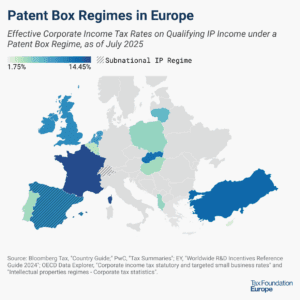
The EU Determined to Reform the Business Tax
3 min readBy:The European Union (EU) recently launched a consultation to reform the EU business taxA tax is a mandatory payment or charge collected by local, state, and national governments from individuals or businesses to cover the costs of general government services, goods, and activities. system, which the European Commission considers is ill-equipped to face the challenges posed by globalization, climate change, digitalization, and population aging. This consultation could lead to proposals for taxes that raise general funds for the EU rather than individual member states.
The purpose of this consultation and consequent commission communication is to set out a vision for EU business taxation and a medium-term action plan. This will outline the priorities for corporate taxation over the coming years to meet the needs of a globalized economy that struggles to recover from the consequences of the COVID-19 crisis. It will also set EU actions regarding the ongoing international discussion on the taxation of the digital economy and a global minimum tax.
The EU budget is funded partially through revenues it raises directly and partially through contributions from member states. This consultation could lead to new “own resources” that the EU raises to fund programs in the bloc.
On one hand, the initiative plans to achieve a framework that will maintain fair competition within the internal market. In the EU Commission’s view, the different corporate tax systems in the EU deter cross-border investment and prevent businesses from fully benefiting from the advantages of the single EU market. The aim is to establish a level playing field for all businesses while maintaining the EU’s international competitiveness.
The Commission also considers the digitalization of the economy has intensified tax competition both within the EU and internationally, “risking a new race to the bottom.” Nevertheless, the “race to the bottom” in global corporate tax rates has stalled in recent years with average corporate tax rates in the mid-20s. According to the Tax Foundation’s latest Corporate Tax Rates Around the World 2020, the weighted average corporate income taxA corporate income tax (CIT) is levied by federal and state governments on business profits. Many companies are not subject to the CIT because they are taxed as pass-through businesses, with income reportable under the individual income tax. rate has declined from 46.52 percent in 1980 to 25.85 percent in 2020 and has leveled off in recent years. Secondly, while corporate tax rates have declined over the past few decades, corporate tax revenues have risen slightly in recent years.
On the other hand, the Commission is looking to safeguard long-term funding for regional governments, investment in public infrastructure, and businesses hardly hit by the changes in the global economy.
Although it is not clearly stated in the consultation it looks like the EU is determined to expand its own resources to fund the EU budget rather than rely on resources from member states. In the budget agreement reached by the European Commission in 2020, the Commission reiterated the importance of additional own resources. Apart from a new digital levy and a financial transaction tax (FTT), the agreement also mentioned a possible financial contribution linked to the corporate sector or a new common corporate tax baseThe tax base is the total amount of income, property, assets, consumption, transactions, or other economic activity subject to taxation by a tax authority. A narrow tax base is non-neutral and inefficient. A broad tax base reduces tax administration costs and allows more revenue to be raised at lower rates. . The EU has been working since 2011 on a common consolidated corporate tax base (CCCTB), and discussion was supposed to be relaunched in 2016.
In its pursuit of additional resources, the EU is apparently moving towards harmonizing the corporate taxation in the EU either through a common corporate tax base, a complete reshuffling of the business taxation, or a single-market tax for multinationals. When reforming the corporate business tax, the EU should consider full expensing as a means to increase private investment. Given the corporate tax difference across countries, countries like Estonia and Latvia that already have good policies for business investment would have their tax systems made worse unless the EU adopts a pro-investment policy like full expensingFull expensing allows businesses to immediately deduct the full cost of certain investments in new or improved technology, equipment, or buildings. It alleviates a bias in the tax code and incentivizes companies to invest more, which, in the long run, raises worker productivity, boosts wages, and creates more jobs. . Companies operating in the EU market could also benefit from the reduction of administrative and tax complexity and tax uncertainty.
The consultation, open until April 1, has the opportunity to drive the tax debate towards policies that provide a foundation for sustainable revenue and economic growth, driven by private investment.
Share this article




